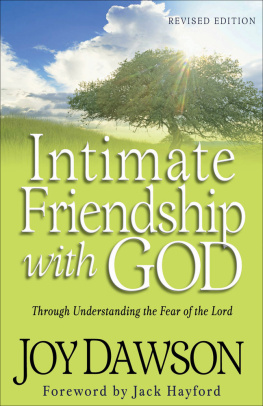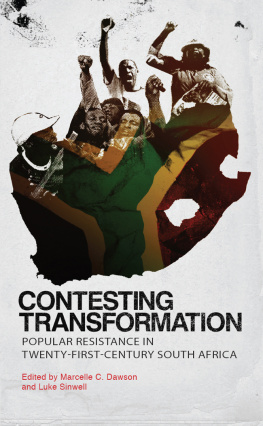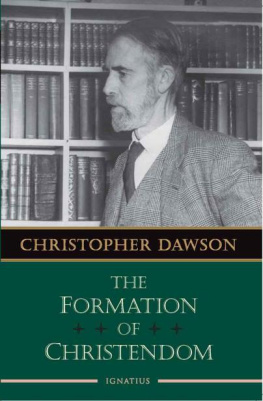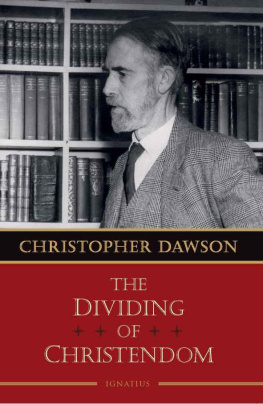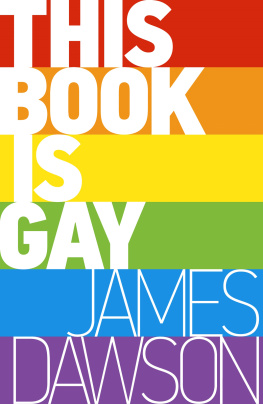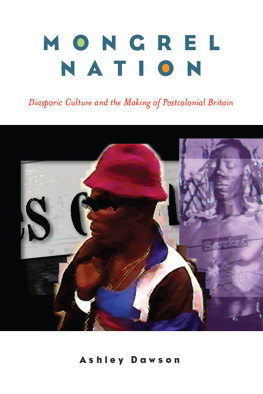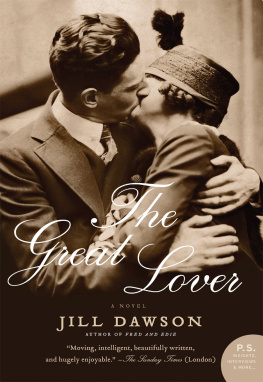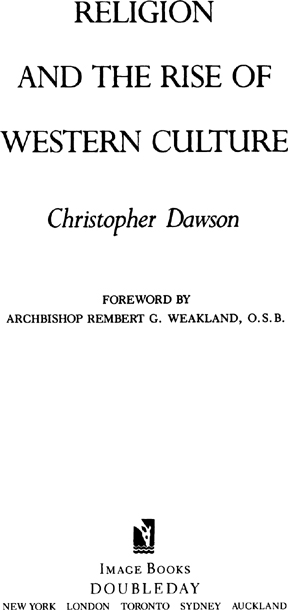The author wishes to express his gratitude to Mr. E. I. Watkin for reading the proofs and making the Index. He gratefully acknowledges the kindness of those named hereunder in granting him permission to use copyright materials in this book:
W. Heffer & Sons, Ltd., Cambridge, for extracts from E. Monsens translation of Snorre Sturlasons Heimskringla (Cambridge, 1932).
FOREWORD
Certain books remain classics. This implies that, although others continue to write on the subject, they cannot do so without referring back to a pioneer work. Christopher Dawsons Religion and the Rise of Western Culture, the substance of his Gifford Lectures of 1948-49, remains such a classic.
Some books are labeled classics because of new information discovered; Dawsons work is a classic because of the brilliant way he synthesized vast amounts of material and brought out the inner threads that connected them. As one reads this book, one is overwhelmed by the breadth of knowledge of the author. His acquaintance with every aspect of the first thirteen centuries of Christianity seems inexhaustible. His awareness of the values, trends, and convictions that underpin each period and the movements within them and his brilliant way of expressing those trends lead the reader to deeper insights and a greater appreciation of the culture being described.
In this book Dawson focuses on the role of religion in forming the culture of our Western civilization. No one knew that picture better than he did. Moreover, he brings to it not only accurate historical knowledge, but also a warmth and sympathetic penetration that shows a personal understanding of the predominant faith of the culture he is treating. For Dawson (b. 1889-d. 1970) was indeed a man of faith, an Anglican until 1914 and thereafter a Roman Catholic.
He devoted his life to a careful analysis of the relationship between religion and culture and, in particular, of this relationship in Western civilization. His work remains a classic in this area of cultural analysis. Historians may find that some of the details can no longer be substantiated by current research and that some of the generalizations have not held up under closer scrutiny, but the vision Dawson paints here remains substantially intact.
Recent surveys point out that religion is still a vital force in Western culture, albeit in a way totally different from in the ages Dawson treats in this book. Today there has been an enormous fragmentation into churches and sects, and religion has become a battleground among diverse understandings of the human person, God, this earth, and how they are all related. But even underneath these differences one can find a common striving that indicates a spiritual hunger that cannot be eliminated from society. These forces are reappearing in those countries where, for several generations, powerful counterforces tried to suppress them. These are indications that a totally secularized culture is not upon us; on the contrary, a new form of religious culture is evolving.
Dawsons insights will have much to say to us if we take that religious dimension of our own culture seriously. They will help us see our roots more clearly and how we have evolved, especially since the Enlightenment. They will also give us the courage we need to stake out the larger visionas Dawson didin the midst of the confusion of a rapidly changing culture. We also will be encouraged to see that culture in relationship to the great religions that, with Christianity in its Western and Eastern manifestations, will help form the future of this planetJudaism, Islam, Buddhism, Hinduism, and all the African religious phenomena that are crying out for expression.
Our future global culture will not be less religious; it will not be more secular. It will be one that is deeply spiritual, although of a religious sentiment purified by the scientific explosion we have experienced and that has characterized our age. We see also that religion is again having a renewed influence on societal issues and know that that role will continue to expand. Dawsons insights will help us reflect on such a crucial intertwining of religion and societal valuesone that marked his analysis of the formative period of Western culture.
Thus, this bookalready a classicis especially timely for today.
Rembert G. Weakland, O.S.B.
Archbishop of Milwaukee
May 12, 1991
CONTENTS
I.
II.
III.
IV.
V.
VI.
VII.
VIII.
IX.
X.
XI.
XII.
Chapter I
Introduction: The Significance
of the Western Development
I N MY previous series of lectures I abstained as far as possible from dealing with the history of Christian culture, not because this lies outside the scope of the Gifford Lectures, but because it is the culture to which we all in some sense belong, and therefore it is impossible for us to study it in the same way as the cultures of the remote past which we can see only through the opaque medium of archaeology or the cultures of the non-European world which we have to understand from the outside and from a distance. This involves a difference in the quality of our knowledge which may almost be compared to the difference between the astronomers knowledge of another planet and the geographers knowledge of the earth on which we live. There is not only a far greater mass of material available for the study of Western culture than for that of any other; but our knowledge is also more intimate and internal. Western culture has been the atmosphere we breathe and the life we live: it is our own way of life and the way of life of our ancestors; and therefore we know it not merely by documents and monuments, but from our personal experience.
Hence any study of religion which ignores and leaves on one side the accumulated experience of the Christian past and looks exclusively to the remote and partially incomprehensible evidence derived from the study of alien religious traditions or even to our own abstract notions of the nature of religion and the conditions of religious knowledge is bound to be not merely incomplete but insubstantial and unreal. And this is most of all the case when we are considering, as in these lectures, the problem of Religion and Culturethe intricate and far-reaching network of relations that unite the social way of life with the spiritual beliefs and values, which are accepted by society as the ultimate laws of life and the ultimate standards of individual and social behaviour; for these relations can only be studied in the concrete, in their total historical reality. The great world religions are, as it were, great rivers of sacred tradition which flow down through the ages and through changing historical landscapes which they irrigate and fertilize. But as a rule we cannot trace them to their source, which is lost in unexplored tracks of the remote past. It is rare indeed to find a culture in which the whole course of this religious development can be traced from beginning to end in the full light of history. But the history of Christendom is an outstanding exception to this tendency. We know the historical environment in which Christianity first arose: we possess the letters of the founders of the Churches to the first Christian communities in Europe, and we can trace in detail the successive stages by which the new religion penetrated the West.



